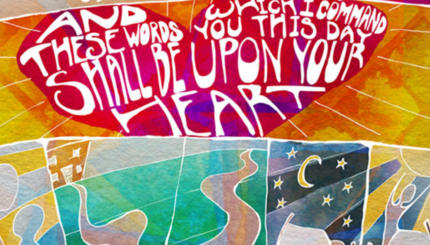Last night marked the beginning of the holiday of Tu B’Av. If you’ve never heard of it, you’re not alone. I only learned about Tu B’Av when I lived in Israel in 2003-2004, but it turns out that the holiday has been around for hundreds of years. Today it is often referred to as “the Jewish Valentine’s Day” because it celebrates love. In the times of the Talmud, the rabbis tell us it was when Jewish women went dancing in the vineyards, and unmarried men went to the fields to find a wife (and we think online dating is interesting!).
Having gotten married just over a month ago, love is on my mind. And thanks to Facebook, love is on my mind even more. The past several weeks have seen the “Love Your Spouse Challenge” on Facebook, a social media exercise that asks people to post a photo a day for seven days showing them and their spouse in love.
I’m not one of those people who posts a lot of photos on Facebook, and I decided not to participate in the “Love Your Spouse Challenge.” I am pretty sure that my spouse knows I love him even without my posting about him on Facebook.
While of course I think it’s fine to post joyful moments on Facebook, it’s important to recognize these can be hard for friends who are experiencing loss or sadness. Having many friends who have faced fertility struggles, I understand how hard it can be for them to see photos of ultrasounds and newborns on Facebook. Mother’s Day and Father’s Day posts can be especially challenging for people for all sorts of reasons. And some of my single friends have recently given voice to how “in your face” the recent Facebook posts on love can feel.
As a consumer of social media, I try to remember that what people post and see on social media is just a tiny snapshot of one’s experiences. We tend to only put our best selves on the internet. And we often forget that that’s what most others are doing too.
Studies about social media have shown that the more we look at Facebook, the more unhappy we are. We see over-curated digital lives of our friends, we compare ourselves, and then we feel a decrease in self-esteem. We forget that the perfect photos from others’ lives reflect only their highlight reels – the best moments they choose to put forward. It turns out the studies tell us that we actually increase our positive feelings when we look at our own Facebook pages, where we tend to put the best of ourselves forward.
Comparing ourselves to others on Facebook is risky because we forget that we are looking at highly curated content. Several bloggers have joked about how the “Love Your Spouse Challenge” doesn’t reflect the realities of married life – which is not all about smiles and bliss. There’s always more nuance to our lives.
There’s a risk of comparing ourselves to others, whether on social media or in other areas of our lives. Judaism has an important message here, shared in a legend about a righteous man named Zusya. The story goes that before Zusya died, he said “When I reach the world to come, God will not ask me why I wasn’t more like Moses, God will ask me why I wasn’t more like Zusya.” We need not worry about being like others, only about being ourselves.
So this Tu B’Av, maybe this shouldn’t just be a holiday about loving others, but also a holiday about loving ourselves.


